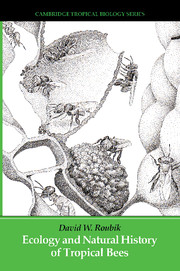1 - Introduction
Published online by Cambridge University Press: 04 August 2010
Summary
Approaches to tropical bee biology
Information gathered from the remaining intact tropical habitats might seem to deserve special treatment, for such data can be thought to represent precise, finely tuned biological interrelationships. Their evolutionary reason for existence might be revealed simply in their current ecology. Tropical data in general are often deemed more significant than comparable data taken in other habitats. Like the first-mentioned bias, this belief can encourage creative speculation, but sometimes it diminishes the accuracy with which the actual setting of a field study is examined or described. For example, tropical secondary growth that returns after the forest is cut away can be impressively green and complex. Yet the largest tree may be only 60 years old, whereas the original forest most likely contained trees exceeding 300 years in age and held several times as many species of plants and animals (Richards 1980; Myers 1984; Whitmore 1984). On a geological time scale the importance of historical factors is further magnified. Most of the Amazon Basin was the bottom of a lake some three million years ago, and some of its vegetation has on several occasions since that time been radically different from what is found there now (Leyden 1984; Absy 1985; Sanford et al. 1985; Graham 1986). The last author shows that although past climatic changes were not severe in lowland tropical areas, a vast portion of these areas became drier during glaciations.
- Type
- Chapter
- Information
- Ecology and Natural History of Tropical Bees , pp. 1 - 24Publisher: Cambridge University PressPrint publication year: 1989
- 1
- Cited by



